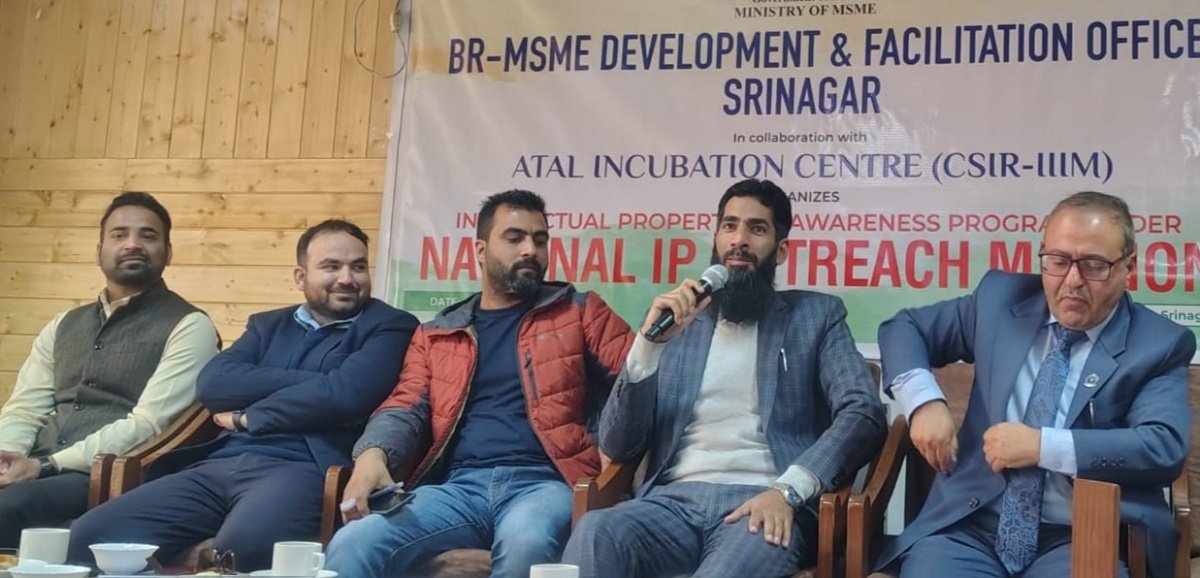From Tradition to Tech: Kashmir Startups Get IP Edge
In the picturesque region of Kashmir, where centuries-old crafts meet modern entrepreneurship, the necessity of safeguarding intellectual property (IP) has become a pressing concern for local startups. Afiya Khan, the founder of a textile startup, experienced this firsthand when she discovered that her meticulously designed Pashmina pattern was being replicated by others without her permission. “I realized ideas can disappear if there is no shield around them,” she reflected, capturing the essence of a growing issue that many entrepreneurs are facing in the region.
On November 13, Afiya was among over seventy attendees at an Intellectual Property Rights (IPR) awareness workshop hosted by the Atal Incubation Centre of the CSIR-Indian Institute of Integrative Medicine. This initiative, organized by the Ministry of Micro, Small and Medium Enterprises under its National Outreach Mission, aimed to educate local entrepreneurs on the importance of protecting their innovations and creations.
The Imperative of IP Protection
Dr. Shahid Jibran, CEO of the incubation centre, opened the workshop by emphasizing a fundamental truth in the world of business: “Protecting your intellectual property ensures ideas can grow, scale, and benefit both your business and society.” His words resonated with the diverse group present, uniting them under the shared understanding that innovation must be safeguarded if it is to thrive.
Throughout the session, participants learned not just about the legal jargon associated with IPR, but also about its practical implications. Mohammed Tariq Ishtiaq, an Assistant Director at the MSME office in Srinagar, brought the discussion back to the regional context. He explained how registering a weaving design or trademark could substantially benefit Kashmir’s rich textile sector, improving market accessibility and allowing artisans to command higher prices for their unique products.
Bridging Research and Innovation
Prof. Parvez A. Mir, the CEO of the CIED-IUST Foundation, pushed the conversation further by urging attendees to bridge research-driven innovation with entrepreneurship. He highlighted the potential for collaboration between academia and local businesses, suggesting that combining traditional skills with modern technologies could catalyze regional growth and sustainability.
As entrepreneurs shared their experiences, it became evident that collaboration was a recurring theme. Ubaid Mehraj, managing director of L-Crystal, eloquently stated, “Registering a design or process turns creativity into a business asset. It protects ideas, opens opportunities, and lets your business contribute to society.” This perspective underscored the transformative power of IP protection, not just for individual businesses, but for the community as a whole.
Government Initiatives and Financial Support
The workshop also highlighted various governmental schemes aimed at supporting MSMEs in Kashmir. Saheel Alaqband outlined programs such as the Credit Guarantee Fund Trust for Micro and Small Enterprises (CGTMSE) and SRI Funds. By alleviating financial pressures, these initiatives empower entrepreneurs to invest in IP protection measures that could otherwise be seen as a financial burden.
Legal expert Zainab Syed took participants through the nitty-gritty of registering designs, trademarks, and patents. She explained how the recently established Intellectual Property Facilitation Centre could assist MSMEs in navigating the sometimes complex legal landscape. Her technical session sparked vibrant discussions about costs, timelines, and strategies for commercializing local innovations, addressing concerns specific to the Kashmiri context.
The Growth of Kashmir’s Entrepreneurship Scene
Kashmir’s entrepreneurial landscape is evolving rapidly, particularly in the wake of increased economic empowerment for women. Since 2020, over 1.72 lakh women-led MSMEs have registered through Udyam and Assist portals. The rise in women’s share of enterprises has jumped from 11.39% in 2020-21 to an impressive 26.62% in 2023-24. The MSME sector now employs over 17 lakh skilled youth, indicative of a robust shift towards self-sustainability and innovation.
In terms of financial empowerment, the region has seen nearly 3.99 lakh loans approved under the Pradhan Mantri Mudra Yojana, along with 1.51 lakh guarantees sanctioned through CGTMSE. These figures highlight a growing confidence among financial institutions in supporting local entrepreneurs, paving potential pathways for them to protect their intellectual property.
Recognizing Traditional Crafts
Furthermore, traditional crafts in Kashmir are no longer merely decorative items but have become instruments of cultural pride and economic opportunity. Fifteen crafts, including Sozni embroidery, Pashmina and Kani shawls, and walnut wood carving, now hold Geographical Indication (GI) tags. The Handicrafts & Handloom Department has been proactive, issuing over 55,000 GI labels designed to protect these regional handicrafts and ensure artisans receive proper recognition and remuneration for their work.
Despite these advancements, challenges linger. Over 700 MSME units closed between July 2020 and November 2024, highlighting the harsh realities of entrepreneurship in an environment lacking adequate legal protection and strategic planning. Such closure serves as a sobering reminder of the risks involved when businesses fail to safeguard their creative outputs effectively.
Success Stories and Future Prospects
The workshop also spotlighted success stories that emanate from a culture of IP protection and strategic planning. A Srinagar-based embroidery startup, for instance, was able to secure a lucrative contract with a national retailer after registering its design. This achievement prompted a significant 30% boost in profit margins, illustrating how IP protection can transform artistic endeavors into commercially viable enterprises.
Additionally, eight more crafts have recently received GI certification, adding to the growing roster of protected intellectual properties in the region. This not only opens new avenues for branding but also enhances export opportunities for local artisans.
In the tech sector, safeguarding innovations through copyrights or patents also cultivates credibility, providing Kashmiri startups with the leverage needed to attract national and international investors.
As the participants left the workshop, the takeaway was unmistakable: Afiya’s sentiment crystallized what many others felt—“I came for IP registration guidance. I leave with a path to make my idea survive and grow beyond the valley.” This sense of empowerment signifies a hopeful trajectory for Kashmir’s entrepreneurial future, as traditional craftsmanship meets modern innovation under the umbrella of intellectual property rights.





